Nothing can spoil a quiet evening spent in front of the fireplace quite like chimney odor. Unfortunately, chimney odors can also occur when the fireplace is not in use, leaving many homeowners scratching their heads as to what is causing their stinky chimney.
Chimney odors should never be ignored and are often the sign of a more serious chimney problem. Because of this, it is important to have a certified professional evaluate your chimney in order to uncover the source of the chimney odor and repair the source to keep it from coming back.
Common Causes of Chimney Odor
There is no one cause of chimney odor; because of this, it often takes the combination of a certified chimney professional and a chimney inspection to uncover the source of the odor. Below are some of the most common sources of chimney odor, what causes them, and how they can be prevented.
Water Entry
 Type of odor: Musty or damp odor that may be more noticeable after a rain storm. Long term exposure to moisture in the chimney can cause mold or mildew growth; in addition to creating a round-the-clock odor, mold growth can also affect the air supply in your home, especially for those with respiratory issues such as allergies or asthma.
Type of odor: Musty or damp odor that may be more noticeable after a rain storm. Long term exposure to moisture in the chimney can cause mold or mildew growth; in addition to creating a round-the-clock odor, mold growth can also affect the air supply in your home, especially for those with respiratory issues such as allergies or asthma.- Cause: While water can get into your chimney system in a number of ways, it most commonly comes in from a damaged chimney cap. In addition to protecting the chimney from moisture, chimney caps also keep debris and animals out of the chimney. Likewise, cracks or holes in the masonry can also cause water to enter the chimney system.
- Signs of water entry: Using a flashlight, look in your firebox or the lower portion of the chimney for signs of moisture or water. Likewise, from the ground look for any evidence that the chimney is cracked or otherwise damaged.
Creosote
- Type of odor: Sharp, smoky odor. Creosote smells are often worst during the hot and humid summer months.
- Cause: Creosote is a naturally occurring byproduct of fuel-burning fires, but is most prevalent with wood burning fires. Tarry creosote can coat the inside of the chimney flue and leave you at increased risk for chimney fire. Annual chimney sweeping removes creosote – as well as the odors that can accompany it.
- Other causes of smoky odors: Your smoky chimney odor may also indicate an air pressure problem; outside air flows down the chimney and into your home, bringing chimney odors with it. An improperly fitting damper or the installation of a new HVAC system can cause pressure imbalances.
Animals
 Type of odor: Sharp, foul, rotting odor.
Type of odor: Sharp, foul, rotting odor.- Cause: A sudden rotting smell almost always indicates the presence of an animal or animal droppings in the chimney. Animals can find their way in through a damaged or missing chimney cap or other surrounding masonry damage on the top of the chimney.
- Getting animals out: Wild animals should ways be treated with caution and should only be removed by a professional. Likewise, it is important to never “smoke out” a trapped animal. Rather than getting out of the chimney, many animals become disoriented or injured by the smoke and heat.
Drafting
- Type of odor: Smoky smells or that similar to creosote
- Cause: If your chimney doesn’t draft properly, smoke and gas – as well as chimney odors – can blow back into and linger in your home. Smoky odors from drafting are often present long after the fireplace has been used, especially on hot or windy days. Drafting issues are commonly caused by an improperly sized flue; if you have installed a new fireplace or changed fuel sources, the flue may need to be resized in order to prevent drafting issues.
- Possible resolutions: Resolving could be as simple as installing a chimney cap or as complex as changing the dimensions of your chimney. What’s most important is getting a technician in to get to the bottom of the issue.
We Offer Chimney Odor Resolutions
Stop dealing with foul odors coming from your fireplace. We have effective solutions that work. Contact Lords Chimney and let a certified professional inspect your chimney and start enjoying your heating appliance once more.
Dial 281-497-4000 or book online with us now.
Every time you burn wood in your fireplace or wood stove, condensation forms on your chimney’s flue. That condensation forms a dark, tar-like, highly combustible substance called creosote. When creosote builds up in your chimney, it can lead to a damaging and dangerous chimney fire, or it can force carbon dioxide back into your home, endangering your family.
Creosote sweeping logs promise a solution. They claim to reduce creosote buildup in your chimney simply by burning them in your chimney. Some such logs carry the seal of approval of the Chimney Safety Institute of America (CSIA), but even the CSIA acknowledges that the logs are not a replacement for your annual chimney sweeping and inspection by a CSIA-certified chimney sweep.
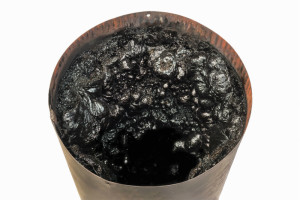
Creosote sweeping logs don’t remove all creosote
Creosote sweeping logs work by sending chemicals up your chimney that react with the creosote, causing it to flake away and fall back down your chimney to your firebox, where it either burns up or can be swept away. At best, the logs only remove up to 60 percent of the creosote from you chimney over a 15-day period. That means that creosote still can build up to dangerous levels within your chimney, blocking smoke from leaving your chimney and potentially igniting a chimney fire.
Additionally, many fireplaces aren’t a straight vertical channel. That means creosote can fall to and gather on your chimney’s horizontal surfaces, where it can build up. If your chimney is a straight vertical line, the creosote that falls into the firebox can cause flare ups that can harm your hearth or someone standing near it.
Creosote sweeping logs can’t spot problems with your chimney
Your annual chimney sweeping is more than just a cleaning. Your certified chimney sweep also inspects your chimney for structural damage, water leaks, crumbling mortar, and other problems. A creosote sweeping log simply can’t help you identify and solve problems with your chimney. Missing your annual chimney inspection gives small problems, like a minor leak, time to grow into a major problem that potentially will be expensive to repair.
More importantly, your certified chimney sweep looks for problems that could lead to a chimney fire or carbon monoxide poisoning. That includes animals that have nested in your chimney or chimney fires that have gone undetected.
Schedule your annual chimney sweeping today!
While the CSIA recognizes that creosote sweeping logs can be a valuable piece of chimney maintenance, eliminating some creosote in between professional chimney sweepings, replacing your annual chimney sweeping and inspection with a creosote sweeping log is dangerous both for your home and your family. If you’re overdue for your annual chimney sweeping and inspection, call the CSIA-certified chimney sweeps at Lords Chimney. We’ll make sure that your chimney is creosote-free and ready to burn safely this winter.
Spring and summer rain showers and thunderstorms are often a welcome reprieve from the scorching temperatures. In addition to cooling us off, these rain storms also keep our lawns and gardens green and our rivers and lakes full and ready for summer fun.
Unfortunately, heavy rain can also lead to a leaky chimney. Chimney leaks are one of the most common chimney problems we see during the summertime. Even chimneys without previous problems can develop leaks – and their accompanying water damage – in as little as one season.
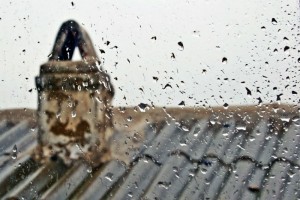
What causes chimney leaks?
Although chimneys look like simple brick or stone columns, they are actually complex structures with a number of different pieces and parts. Because the chimney is constantly exposed to the elements, its masonry is at greater risk for damage and breakdown.
The following are some of the most common causes of chimney leaks.
Chimney cap: The chimney cap protects the top of your flue from water entry, as well as animals and debris. Without a properly fitted chimney cap, the flue and fireplace are left completely exposed to water entry from rain.
Flashing: Flashing is the water tight strips that seal the seam between your roof and the chimney structure. If flashing is incorrectly installed, damaged, or merely loses its seal due to wear and tear or age, water can easily seep through any gaps. This can cause water damage to not only the roof and chimney, but also the ceilings and walls around the chimney.
Masonry damage: If one side or part of your chimney is often directly exposed to rainfall or other sources of water, the masonry may deteriorate or become damaged faster than the rest of the chimney. Water can cause bricks to crack and spall; in addition to making your chimney look aged or unkempt, it can also affect the structural stability of the chimney and lead to chimney leaks.
Symptoms of a leaky chimney
Many homeowners falsely assume that all leaky chimneys present themselves as visible water in the fireplace or flue. However, because of the size and complexity of most chimney systems, chimney leaks are often not recognized until they’ve already caused significant damage.
Below are some of the signs that may indicate your chimney is leaking.
- Water or condensation inside the firebox
- Sound of dripping water in the chimney
- Moisture, leaks, or water staining on walls or ceilings around chimney
- Musty or dank odors, especially after it rains
- Cracked or spalled interior or exterior masonry
Preventing chimney leaks
The best way to prevent chimney leaks is by having regular preventative maintenance done on your fireplace and chimney. Annual chimney sweepings and inspections can often identify any new chimney or masonry damage, allowing you to have it repaired before it leads to a chimney leak.
Another option for preventing leaks and water damage to your chimney is to have your masonry waterproofed. The waterproofing process involves the application of a specially designed sealant that keeps water out while allowing the masonry to retain its semi porous nature. These products can even be applied to chimneys with existing water damage as a way to keep it from getting worse.
If a summer rainstorm has left you with a leaky chimney, contact Lord’s Chimney today. Our expert staff can identify and resolve the source of your leaky chimney!
As a homeowner, there are lots of things around your home, both inside and outside, that need to be regularly maintained. And let’s face it – it’s easy to get so overloaded with household to-do lists that sometimes some of the most important places get overlooked.
We’ve noticed that fireplaces and chimneys tend to get thrown into this overlooked category since they are only used for a portion of the year. Sound all too familiar? Well, don’t burn yourself out figuring out how you’ll fit in yet another job. Simply give our experts a call to handle it all!
Chimney Inspections & Sweepings
Annual chimney inspections are essential when it comes to keeping your system standing strong for the long haul. All kinds of hidden dangers could be lurking and putting your home at risk, and it takes the trained eyes of a pro to spot and resolve them. Oftentimes, what homeowners think of as no big deal (even something as seemingly minor as a broken tile or brick) are actually quite dangerous.
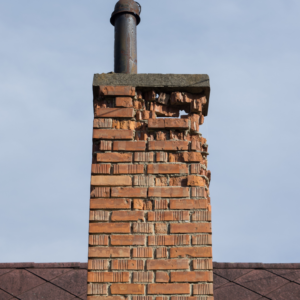 When it comes to chimneys, the sooner any issues are spotted and addressed, the better. If there is a crack, it will only continue to grow. If mold shows up, it will only spread. If things aren’t heating correctly, this will only continue, costing you more to operate the appliance and putting your home at risk.
When it comes to chimneys, the sooner any issues are spotted and addressed, the better. If there is a crack, it will only continue to grow. If mold shows up, it will only spread. If things aren’t heating correctly, this will only continue, costing you more to operate the appliance and putting your home at risk.
That’s why we urge all of our customers to book inspections at least once per year and always before kicking off your burning season. During these, our sweeps will look for any flaws, build-up, and imperfections, and then suggest any further maintenance, like sweepings or repairs, as necessary.
And what’s the importance of a chimney sweeping? To start, they remove any build up, excess debris, and creosote, which is the main cause of chimney fires. And apart from being fire hazards, blockages can lead to smoke in your home, carbon monoxide poisoning, and a lack of efficiency.
Repair & Restoration Services
Now, chimney sweepings and inspections are an important part of chimney maintenance, but they’re still just only one part of the equation. That’s why we offer a wide range of chimney, masonry, and venting services and repairs, all of which allow us to better serve our customers and meet all of their chimney and fireplace needs.
If your fireplace or chimney is worn down after years of use, we can help restore it to its former glory. Our fireplace restoration services can fix every part of your chimney, from the chimney cap at the top to the firebox at the bottom. Some of our many services include tuckpointing, leaky chimney repairs, chimney pressure washing, relining services, wildlife removal, troubleshooting, and even replacements or facelifts.
Not sure where you stand or what you need? Give us a call! We’d be happy to answer your questions and get you where you need to be.
Need Dryer Vent Services?
In addition to our chimney services, we can also clean dryer vents, as well as assist with installation and re-routing. Even if you regularly clean your lint trap, lint will still accumulate in your dryer vents and hoses over time, which can then create clogs and fire hazards. In fact, dryer-related issues cause thousands of house fires every single year. This one service well worth investing in.
Clean dryer vents can also help your dryer run more efficiently, wasting less energy and resulting in dryer clothes after each load. This saves you money month to month, and keeps your dryer and clothes from experiencing excess wear, too.
We’re Trusted Throughout Houston
At Lord’s Chimney, we have been proudly providing the greater Houston area with chimney, fireplace, masonry, and vent services for years. If you’re experiencing chimney issues, there’s no better crew to trust!
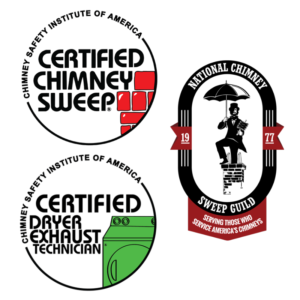 Why do so many turn to us time and time again? Well, for one thing, we make education a priority. We’re certified with the Chimney Safety Institute of America (CSIA), members of the National Chimney Sweep Guild (NCSG), and maintain a long list of certifications, associations, awards, and 5-star reviews. One look at our credentials and it’s clear – we take what we do seriously!
Why do so many turn to us time and time again? Well, for one thing, we make education a priority. We’re certified with the Chimney Safety Institute of America (CSIA), members of the National Chimney Sweep Guild (NCSG), and maintain a long list of certifications, associations, awards, and 5-star reviews. One look at our credentials and it’s clear – we take what we do seriously!
In the end, when you hire a sweep for your chimney inspections, sweepings, and more, you deserve to work with someone you can trust. If your sweep is associated with reputable organizations, experienced, and has a strong relationship with the community it serves, these are all solid signs that they’ll have your back throughout it all. When you hire us, we’ll treat you and your fireplace with respect!
Keep Your Home Safer By Working With Us
A clean and well-maintained chimney and fireplace doesn’t just help with efficiency… it also ensures your home stays a safer place to live season after season. Stay out of harm’s way by reaching out to our highly trained and qualified staff today. When you work with Lords Chimney, you work with the best!
The new year is a time of new beginnings. People make resolutions to change their lives in a number of ways, spanning everything from eating healthier, spending more quality time with family, or taking the time to pamper themselves.
This year, in addition to your normal resolutions make it a priority to take better care of your chimney!
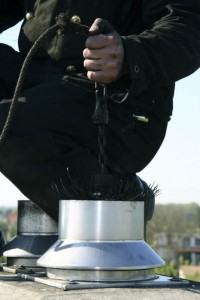
Chimneys should be swept and inspected annually, and there is no better time to do get it done then at the start of the new year. Having your chimney swept now ensures that you and y our family have the peace of mind to enjoy using your fireplace all year long.
Why do chimneys need to be swept?
Some homeowners believe that by removing ash from and regularly cleaning their firebox that their entire chimney system is clean. However, this is not the case. While firebox care is an important part of fireplace system maintenance, having your chimney swept is equally important.
According to the Chimney Safety Institute of America, all chimneys should be swept annually. One of the most important reasons to have your chimney swept is to remove creosote. Creosote is a thick, dark, smelly, and sticky natural byproduct of fuel burning fires that coats the inside of the flue. Because creosote is highly flammable, it can be easily ignited by stray sparks or embers. In fact, creosote is the number one leading cause of chimney fire.
In addition to removing creosote, certified chimney sweeps will also remove any soot, ash, or debris from inside the flue. Doing this reduces your risk of chimney fire and allows smoke and gas to freely move up the chimney and out of your home.
Do I have to have my chimney inspected?
Arguably more important than an annual chimney cleaning is the annual chimney inspection. According to the National Fire Protection Association, homeowners should have their chimneys inspected each year. In fact, an inspection may indicate that your chimney does not need to be swept that year.
Having an annual inspection alerts you to any changes in the condition of your chimney. This is especially important as it may help you uncover small problems – such as minor damage to the masonry – before they turn into larger issues needing costly, extensive repairs.
“A chimney inspection is like an annual dental check-up,” said CSIA Director of Education Ashley Eldridge. “It’s preventative maintenance that helps minimize potential hazards.”
Chimney inspections are also conducted as a way to uncover the root cause of ongoing issues such as leaks, odors, or animal entry.
Who should I trust to clean and inspect my chimney?
You should only trust your chimney to a certified chimney sweep. Roofers, general contractors, and handymen simply do not have the necessary knowledge and expertise to correctly clean the chimney or identify emergent issues.
If you’re ready to start the new year with a clean chimney, contact Lord’s Chimney today. Our staff of highly trained technicians can help ensure that your chimney is in excellent condition and is safe to use for the rest of the year.

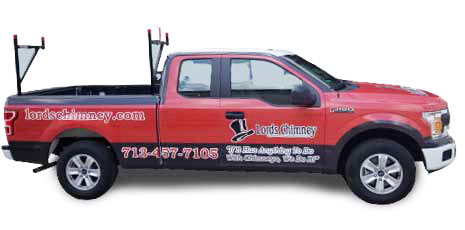
 Type of odor: Musty or damp odor that may be more noticeable after a rain storm. Long term exposure to moisture in the chimney can cause mold or mildew growth; in addition to creating a round-the-clock odor, mold growth can also affect the air supply in your home, especially for those with respiratory issues such as allergies or asthma.
Type of odor: Musty or damp odor that may be more noticeable after a rain storm. Long term exposure to moisture in the chimney can cause mold or mildew growth; in addition to creating a round-the-clock odor, mold growth can also affect the air supply in your home, especially for those with respiratory issues such as allergies or asthma. Type of odor: Sharp, foul, rotting odor.
Type of odor: Sharp, foul, rotting odor.

 When it comes to chimneys, the sooner any issues are spotted and addressed, the better. If there is a crack, it will only continue to grow. If mold shows up, it will only spread. If things aren’t heating correctly, this will only continue, costing you more to operate the appliance and putting your home at risk.
When it comes to chimneys, the sooner any issues are spotted and addressed, the better. If there is a crack, it will only continue to grow. If mold shows up, it will only spread. If things aren’t heating correctly, this will only continue, costing you more to operate the appliance and putting your home at risk. Why do so many turn to us time and time again? Well, for one thing, we make education a priority. We’re certified with the
Why do so many turn to us time and time again? Well, for one thing, we make education a priority. We’re certified with the 